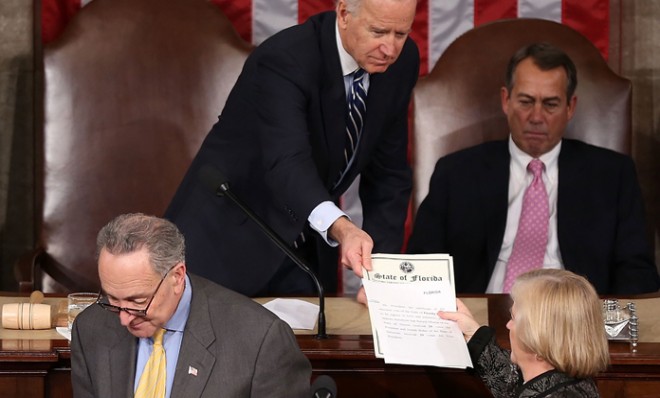We're halfway to eliminating the Electoral College
Rhode Island brings American democracy one step closer to the popular vote

A free daily email with the biggest news stories of the day – and the best features from TheWeek.com
You are now subscribed
Your newsletter sign-up was successful
Thanks to Rhode Island, the United States is closer than ever to getting rid of the Electoral College.
Recently, the state signed the National Popular Vote interstate compact, which, when active, will guarantee that all of Rhode Island's electoral votes go to the winner of the popular vote in all 50 states.
However, the compact kicks in only when states representing more than half of the country's electoral votes sign on. Once that happens, the presidential candidate who wins the popular vote is guaranteed to win the election because he or she will automatically be given more than 50 percent of the electoral vote.
The Week
Escape your echo chamber. Get the facts behind the news, plus analysis from multiple perspectives.

Sign up for The Week's Free Newsletters
From our morning news briefing to a weekly Good News Newsletter, get the best of The Week delivered directly to your inbox.
From our morning news briefing to a weekly Good News Newsletter, get the best of The Week delivered directly to your inbox.
Rhode Island officially gives the National Popular Vote interstate compact 136 electoral votes — more than halfway to the goal of representing half of the country's 538 total electoral votes.
Considering that Rhode Island actually is over-represented in the Electoral College (it makes up 0.34 percent of the population but 0.74 percent of the college), why would it want to join a movement that lessens its influence?
The answer is that Rhode Island, like Delaware and Wyoming, is routinely ignored in presidential elections because it reliably votes for one party. This is bad for just about everyone, writes The New Yorker's Hendrik Hertzberg:
The status quo is not good for small states. It’s not good for big states. It’s not good for medium-size states. The only states it’s good for are swing states, and their ranks are shrinking. Last time, there were just nine, marking the first election in a century or two in which the number of swing states was in single digits. There are now fewer of them than there are National Popular Vote states. [The New Yorker]
If the popular vote were paramount, candidates might actually visit the National Popular Vote states — Maryland, New Jersey, Illinois, Hawaii, Washington, Massachusetts, Vermont, California, and Rhode Island, plus Washington, D.C. — instead of spending all their time in Ohio and Florida.
A free daily email with the biggest news stories of the day – and the best features from TheWeek.com
So why haven't more states joined the cause? It might be related to the fact that all of the aforementioned states are blue. While there is "nothing inherent in the proposal that gives Democrats an advantage," writes Dylan Matthews in The Washington Post, the memory of former Vice President Al Gore winning the popular vote but losing the election in 2000 has created the impression that the popular vote favors Democrats.
That means a red state like Texas will be reluctant to support it, no matter how much extra attention and Super PAC cash it stands to gain. To overcome that stigma, the National Popular Vote movement has several options, Matthews argues:
All of which is to say that one of two things needs to happen if the National Popular Vote is going to come into effect. Either Democrats need to win a lot — a lot — of state elections, or else the issue has become nonpartisan and Republican legislators in deep red states have to get on board.
You could imagine a reverse-2000 scenario, where a Democrat wins in the electoral college but loses the popular vote and Republicans suddenly begin wondering whether the college is such a good idea after all. [The Washington Post]
Polls have repeatedly shown that Americans favor getting rid of the Electoral College. It is their state legislators, however, that will ultimately decide whether the popular vote will decide future elections.
Keith Wagstaff is a staff writer at TheWeek.com covering politics and current events. He has previously written for such publications as TIME, Details, VICE, and the Village Voice.